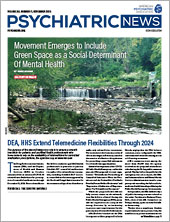Many patients with bipolar disorder take antidepressants in combination with other medications to reduce recurring depressive episodes. While some
guidelines suggest antidepressants may help with acute symptoms, there is less evidence to support maintenance therapy given limited data on long-term efficacy of antidepressants and their potential risk of triggering manic episodes.
A report published earlier this year in the New England Journal of Medicine aimed to address these questions about the risk-benefit profile of maintenance antidepressant treatment for patients with bipolar I disorder.
The study by Lakshmi Yatham, M.B.B.S., a professor and head of psychiatry at the University of British Columbia in Vancouver, involved 177 adults with bipolar I disorder who had experienced remission of depression after taking escitalopram or bupropion XL for two weeks. The participants were randomly assigned to continue taking antidepressants for 52 weeks (maintenance group) or switch to placebo (discontinuation group) after six weeks; the antidepressants were taken in combination with mood stabilizers and/or second-generation antipsychotics throughout the trial.
The primary outcome of interest for the study was the occurrence of any mood-related event, such as the emergence of a new manic, depressive, or mixed-state episode; hospitalization for mood symptoms; the need for additional medications to manage symptoms; or any suicidal behavior. The researchers also examined the rates of some of these individual events.
After 52 weeks, there was no statistical difference between mood-related events between the two groups (31% of individuals in the maintenance group and 46% in the discontinuation group experienced a mood-related event). However, individuals in the maintenance group showed a 57% reduced risk of depression recurrence compared with those in the discontinuation group.
There were more manic episodes reported by participants in the maintenance group than in the discontinuation group (11 versus 5). Yatham noted that three of these manic episodes occurred within the first six weeks when both groups were on the same treatment, and all three happened to be participants in the maintenance group.
Yatham and colleagues also compared all mood-related events reported by the patients in the two groups from week 7 onwards (when the two groups had differing therapies). They found that people in the maintenance group were 40% less likely to experience any mood-related event and 59% less likely to experience depression recurrence than those in the discontinuation group.
“We did not hit the primary outcome, but I think many clinicians would say there is a signal indicating some benefit for longer-term antidepressant use,” Yatham told Psychiatric News. “If a patient’s acute depression symptoms improve with an antidepressant, I think it is reasonable to continue medication while being vigilant for a manic switch.”
Nassir Ghaemi, M.D., M.P.H., a professor of psychiatry and pharmacology at Tufts University School of Medicine, warned that studies of maintenance depression care should always be examined with a critical eye.
He noted that maintenance trials like this one are biased because they assess patients who initially respond to the antidepressant for an acute depressive episode, after which the antidepressant is stopped 8 weeks later.
They relapse quickly, which proves nothing about long term efficacy. “What you have shown is people who responded in the short term may get worse in the short term once you take the medication away,” he told Psychiatric News.
Additionally, he noted that the reported antidepressant responders for this NEJM study did not come from a randomized or blinded clinical study, and such trials of acute bipolar depression show that the apparent antidepressant benefit is equal to placebo.
“It ignores the important question of whether we should be prescribing antidepressants for bipolar depression in the first place; the preponderance of clinical data suggests they are not effective.”
Joshua Rosenblat, M.D., an assistant professor of psychiatry at the University of Toronto and staff psychiatrist at the Mood Disorders Psychopharmacology Unit at Toronto Western Hospital, acknowledged that there is mixed evidence on antidepressant efficacy in patients with bipolar depression. But there is a clinical reality that these patients are seeking out and being prescribed antidepressants.
“Many patients I’ve seen … understand the risks [of antidepressants for patients with bipolar disorder],” Rosenblat said. “They tell me they their hypo/mania is not that bad, and they don’t want to be taken off their antidepressant.”
Rosenblat said the NEJM study offers some reassurance that antidepressants may offer some long-term protection for patients who want to continue taking the medication. He said he also prescribes antidepressants to patients experiencing bipolar depression with comorbid anxiety.
“We should try and limit antidepressants in bipolar but at the same time we should not kick them out of our armamentarium,” he said.
This study was supported by the Canadian Institutes of Health Research. ■

